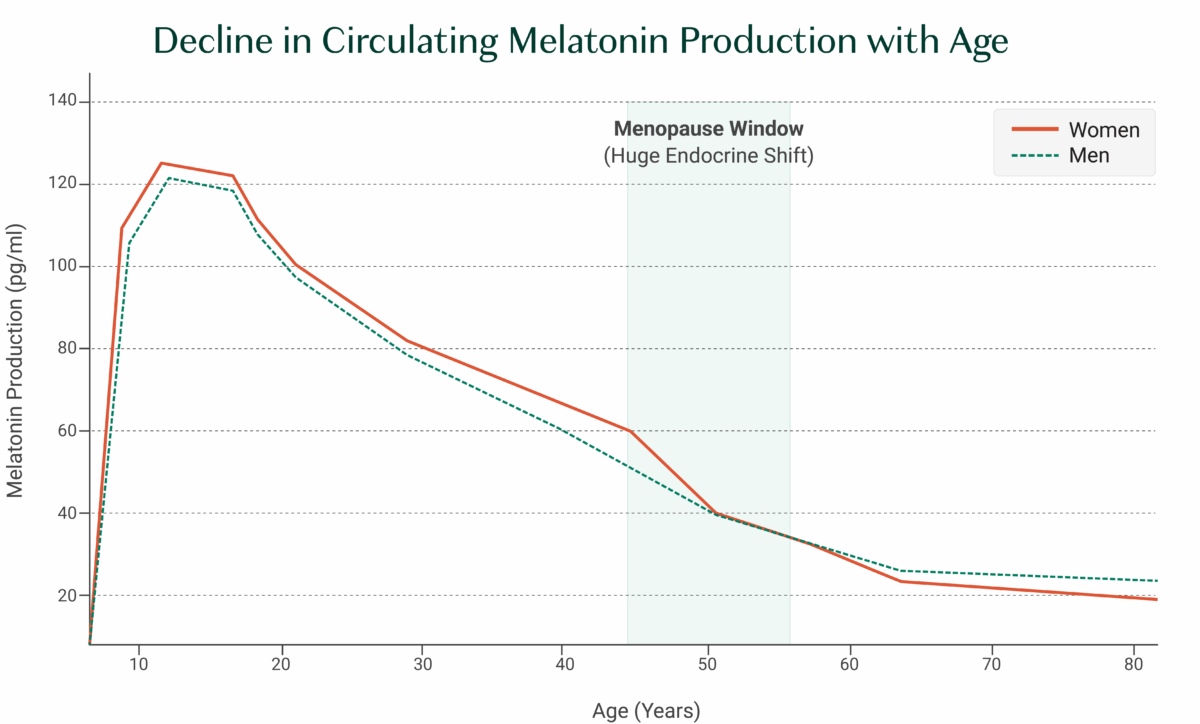It’s not just for rest—new research shows melatonin plays a critical role in bone density.
At around 2:40 every morning, something remarkable happens inside your body.
While you sleep, your brain begins its nightly deep-clean. Waste is flushed. Nerves reset. Inflammation cools. And—if your body has enough of this essential hormone—your bones quietly begin to rebuild.
That hormone is melatonin.
Yes, the same one you’ve seen in sleep aids and jet lag remedies. The one most people dismiss as just a way to fall asleep faster.
But as Dr. Deanna Minich, one of the world’s leading nutrition scientists, explains—melatonin is so much more than that. It’s a master regulator of your circadian rhythm, immune system, inflammation levels, and even the activity of your bone-building cells.
There’s just one problem: after age 40, melatonin production begins to drop.
And that’s bad news for your bones.
AlgaeCal’s resident bone health expert Lara Pizzorno recently sat down with Dr. Minich to unpack the real story behind melatonin: what it does, why it matters, and how—just like vitamin D—it may soon be considered essential for staying strong, healthy, and active as you age. Click on the link below to watch the full interview. You’ll be surprised at what you learn.
In part 1 you’ll learn:
- What melatonin is, where it’s found, and how it regulates your body’s sleep–wake rhythm
- How melatonin production naturally declines with age
- Melatonin’s key role in triggering sleep and supporting nighttime detoxification
- The link between low melatonin and menopausal sleep disturbances
- Why late-night screen time tricks your brain into “day mode” and shuts down natural melatonin release
In part 2 you’ll learn:
- How melatonin shields your brain, eyes, and mitochondria from oxidative stress
- Why plant-based melatonin works smarter—and lasts longer—than synthetic versions
- The surprising way melatonin helps protect and rebuild bone tissue
- How your gut bacteria influence both melatonin levels and bone strength
- Why chronic stress “steals” the raw materials your body needs to make melatonin
- Smart dosing tips to get the sleep benefits, without morning grogginess
Melatonin Isn’t Just a Sleep Hormone
If you’ve ever taken melatonin before bed, you probably thought of it as a natural sleep aid. Something to help you drift off a little faster after a long flight or a restless night.
But according to Dr. Deanna Minich, melatonin’s role in the body goes far deeper.
“People often think of melatonin as just the sleep hormone,” she says, “but I think that really does it a disservice. Because it’s a circadian rhythm modulator. It’s an immune regulator. It’s an antioxidant. It’s anti-inflammatory.”
In short, melatonin doesn’t just put you to sleep—it tells your entire body when to do what. It helps your cells, your hormones, your digestion, even your bone-building cycle run on schedule.
And it all starts with darkness.
“As we get light into our eyes during the day, we suppress melatonin,” Dr. Minich explains. “And then, as the sun sets and we get into darkness, that’s when melatonin comes out. So it’s very much governed by light and dark.”
But melatonin isn’t just made in the brain. In fact, as Dr. Minich points out, your body makes it in more places than you’d expect.
“Melatonin is made in all kinds of tissues. It’s made in the gut, it’s made in the bone marrow, it’s made in the skin, it’s made in the mitochondria.”
But there’s a catch: as you age, your body makes less of it. “As we get older, we make less and less melatonin. Especially women in menopause. That’s a huge shift in endocrine function.”
And that’s when the cracks begin to show: lighter sleep, middle-of-the-night wakeups, slower recovery, higher inflammation—and faster bone loss.

Melatonin and Bone Health
If melatonin only helped you sleep, it would still be worth your attention.
But as Dr. Deanna Minich reveals, its influence stretches far beyond the bedroom — all the way to the cells that shape your bones. “There are some cell studies that suggest melatonin could be helpful for osteoblast activity — the bone-building activity,” she explains. “And also on the other side, to help with reducing the inflammatory cytokines that can be implicated with the osteoclasts.”
In other words, melatonin plays both offense and defense. It supports the cells that form new bone — the osteoblasts — and helps quiet the inflammation that can activate the bone-breakers: osteoclasts.
But that’s just the beginning. “It can stimulate a number of different peptides that would relate to bone,” Dr. Minich adds. And since melatonin also influences collagen — the structural protein that gives bone its tensile strength — its role in skeletal health is foundational.
There’s another reason scientists are so intrigued by melatonin: its chemistry.
“It’s both fat-soluble and water-soluble,” Dr. Minich explains. “So it’s going into every part of the cell — and every cell. And it acts as an antioxidant. In fact, one molecule of melatonin can scavenge up to 10 free radicals.”
That makes it far more versatile than more familiar antioxidants. “Vitamin C,” she notes, “might scavenge one or two. And vitamin E is more limited to fat-soluble areas. But melatonin operates in both worlds.”
And that matters — especially during menopause. “As women go through menopause, in the absence of estradiol, the body becomes more susceptible to immune dysregulation, inflammation, oxidative stress. Melatonin helps counter that. It’s very protective.”
So protective, in fact, that some researchers now believe the body’s gradual decline in melatonin production may help explain why so many systems — sleep, cognition, bone density — begin to deteriorate with age.
“Melatonin is not just working on the bones,” Dr. Minich says. “It’s working around them — on the systems that keep the body in balance.”
And that may be the most important point of all.
Melatonin isn’t just a sleep hormone. Or a bone nutrient. Or an antioxidant.
It’s all of them. Working together.
Pretty amazing, right? And that’s just a fraction of what Dr. Minich reveals in this amazing interview.





Pat Hayden
November 10, 2025 , 10:07 amVery interesting indeed!